US Top Mideast Commander Arrives In Israel
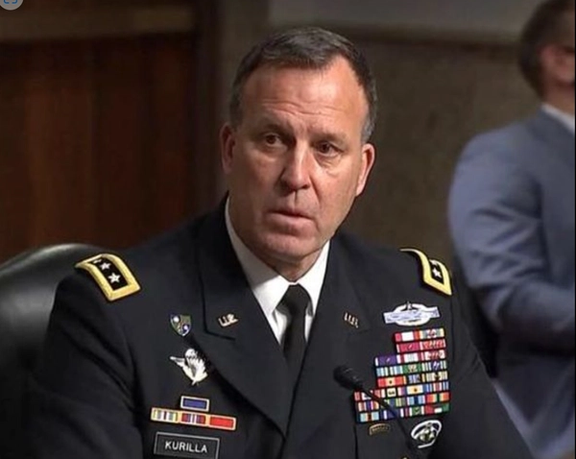
The top US general overseeing American forces in the Middle East made an unannounced trip to Israel on Tuesday ahead of a visit by President Joe Biden on Wednesday.

The top US general overseeing American forces in the Middle East made an unannounced trip to Israel on Tuesday ahead of a visit by President Joe Biden on Wednesday.
He expressed hope to be able to ensure the Israeli military has what it needs as it fights a deepening war against Palestinian militant group Hamas.
The trip by Army General Michael "Erik" Kurilla, head of US Central Command, is the latest by a senior US official to Israel ahead of an expected ground assault by Israel's military in Gaza.
The US military is increasing its firepower in the region, aiming to prevent Iran and other Iran-backed groups from getting involved in the conflict as international fears of a wider, regional war grow.
The Pentagon is also rushing weaponry, including air defenses and munitions, to Israel.
"I'm here to ensure Israel has what it needs to defend itself, particularly focused on avoiding other parties expanding the conflict," Kurilla told Reuters, which is traveling with him, in brief remarks before landing.
A US official told Reuters Kurilla was scheduled to hold high-level meetings with Israel's military leadership, ensuring a clear understanding of the close US ally's defense requirements.
Kurilla was also expected to outline US military support aimed at avoiding an expansion of the Israel-Hamas conflict.
Washington has deployed an aircraft carrier strike group to the eastern Mediterranean and is sending another carrier to the region in the coming days, moves the Biden administration says are meant as a deterrent, not a provocation.
The US already has a network of bases in the Middle East with troops, fighter aircraft and warships.
The United States has also told some troops, potentially 2,000, to be ready to deploy within 24 hours if notified - instead of the usual 96 hours - and could include units that provide assistance like medical aid if needed, a US official said on Monday.
Report by Reuters

Russia’s President Vladimir Putin, who has been isolated on world stage, entered the diplomatic fray of the Israel-Hamas war on Monday speaking with regional leaders.
Putin who spoke with Iran’s President Ebrahim Raisi and leading Arab powers in an attempt to secure a ceasefire in the war between Israel and Hamas.
Raisi was quoted as telling Putin that supporting the Palestinians is Iran's foreign policy priority, but the "resistance" groups make their own independent decisions, Iranian state media reported.
They quoted Raisi as also telling the Russian president: "There is a possibility of the conflict between Israel and Palestinians expanding to other fronts."
Iran’s clerical rulers, who have supported militant Arab groups for four decades with money, weapons and training, celebrated the Hamas attack on Israel and the killing of over 1,400 Israelis. The United States has warned Tehran not to get directly involved, as it has sent a powerful naval task force to the Eastern Mediterranean to deter Iran’s proxy the Hezbollah from opening a northern front against Israel.
Russia, which has relationships with Iran, Hamas, major Arab powers as well as with the Palestinians and with Israel, has repeatedly said the United States and the West have ignored the need for an independent Palestinian state within 1967 borders.
Russia’s relations with the West have significantly worsened after it invaded Ukraine last year trying to replace the government in Kyiv and annex large parts of the country.
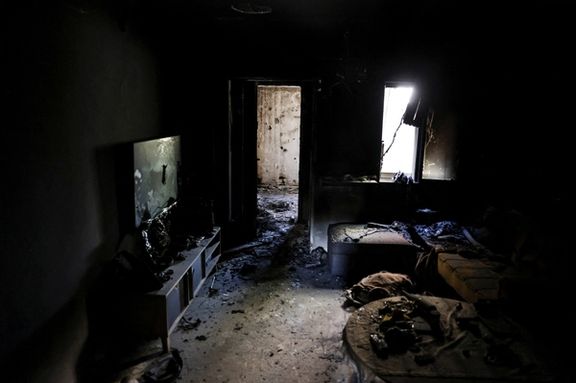
Iran has defended the Hamas attack on Israel that has killed at least 1,500 as “a natural response within the framework of legitimate rights.”
Foreign Ministry spokesman Naser Kanaani said during his Monday press conference that “the actions taken by the resistance front were within their rights, in response to the Zionist crimes against Palestinians.”
Kanaani held photos of the aftermath of the bombing on Gaza which followed the infiltration of militants by air, land and sea, slaughtering hundreds of civilians, and reiterated Tehran’s warning that if the offensive on the enclave continues, the situation could escalate beyond control, “jeopardizing international peace and security.”
However, when he was directly asked about Iran engaging in the war in case of Israel's ground offensive in Gaza, Kanaani dodged a tangible response and only said that Hamas can defend itself. Thousands of Hamas operatives infiltrated Israel by land, air and sea on October 7, massacring hundreds of civilians and kidnapping at least 199 into Gaza, including women and children.
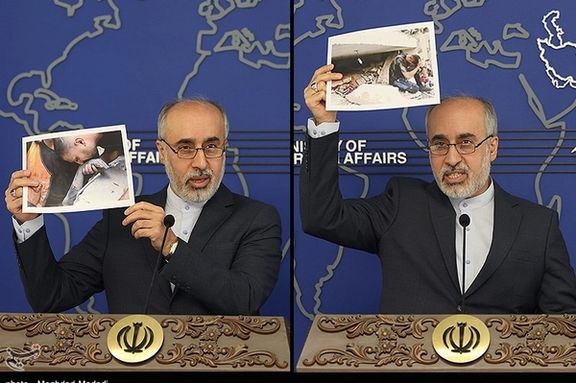
Kanaani said that the actions “cannot be limited to a single front,” and that Israelis "expose themselves to all sides that consider themselves committed to supporting the Palestinian people," suggesting its proxies on Israel's Lebanese and Syrian borders will once again be mobilized. On Sunday, Hezbollah began its most active day of attacks against Israel since the war began as tensions simmered and 28 towns and villages in Israel were subsequently evacuated.
Kanaani claimed that the Palestinian resistance represents the Palestinian nation against Israel, a statement that directly contradicts remarks by Mahmoud Abbas, the president of the State of Palestine and the Palestinian National Authority. Abbas criticized Hamas on Sunday but then quickly rescinded the comment after alleged pressure from Hamas which controls the Gaza Strip.
Palestinian news agency WAFA initially quoted Abbas telling Venezuelan President Nicolas Maduro that Hamas’ policies and actions “do not represent the Palestinian people", the Palestine Liberation Organization the only legitimate representative of the Palestinian people. The reference to Hamas was later removed, the statement only claiming "the PLO is the sole legitimate representative of the Palestinian people, and not the policies of any other organization.”
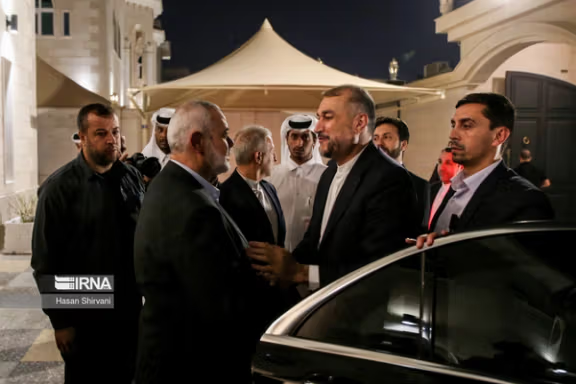
Iran’s Foreign Minister Hossein Amir-Abdollahian, who arrived back in Iran after a tour of Iraq, Syria, Lebanon and Qatar Monday, has been equally threatening in his language, warning of a “huge earthquake” in Israel if airstrikes continue on the Gaza Strip. Meanwhile, the regime continues to deny its being behind the war declared by Hamas on October 7.
Amir-Abdollahian met with leaders of Hamas, Hezbollah, and Islamic Jihad during his trips to gain accurate intelligence on the status of Hamas on the “battleground,” the Iranian diplomat said. Hamas has reassured Iran that it has the “necessary equipment” to confront Israel, not surprising after years of being funded at least $100m annually in addition to military and logistical support.
After his meeting with Hezbollah leader Hassan Nasrallah over the weekend, Amir-Abdollahian said “I know about the scenarios that Hezbollah has put in place. Any step the resistance will take will cause a huge earthquake in the Zionist entity.” Hezbollah, the biggest of Iran's proxies, garners at least $700m a year in funding, and is known to have a far greater arsenal at its fingertips thanks to regime support, which the group showcased just weeks ago at a military exhibitionfor the media.
The regime terms Israel "the Zionist entity" or "Zionist regime" and the "resistance" front or axis is the term to describe Iran's logistic, financial and intelligence support for Palestinian terrorist groups such as Hamas and Islamic Jihad. It also supports proxies on Israel's other borders, Iran and Lebanon, in addition to several others around the region.
Amir-Abdollahian is scheduled to travel to Saudi Arabia for an urgent open-ended extraordinary meeting of the Organization of Islamic Cooperation (OIC) on Wednesday to address the escalating war. The meeting was called by Riyadh, which until the war broke out was teetering ever closer to a normalization deal with Israel which Iran had vocally opposed, leading analysts to suggest the war was orchestrated to debilitate the talks.
While Iran tries to make it look like it is pursuing diplomatic means to end the crisis, the Islamic Republic’s authorities continue threatening Israel with destruction and are not shy about their military and intelligence support for Hamas. Echoing similar sentiments by Supreme Leader Ali Khamenei, Revolutionary Guard commander-in-chief Hossein Salami said Monday that the new Gaza war is “the first phase of the impending collapse of the Zionist regime.”
Iran sent a veiled warning through its UN mission on Saturday against Israel's potential ground invasion of Gaza. The Iranian message stressed that it does not want further escalation, but warned, "If the Israeli apartheid’s war crimes and genocide are not halted immediately, the situation could spiral out of control and ricochet far-reaching consequences".
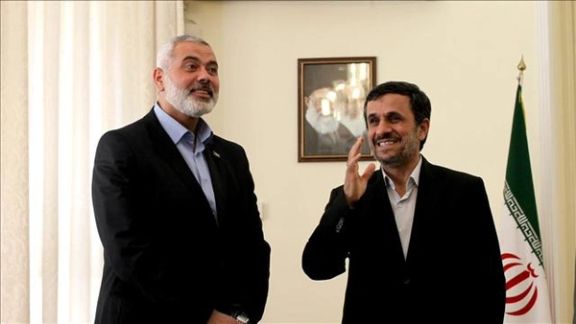
Some officials, including former President Mahmoud Ahmadinejad, are seemingly pressured in Iran to echo Ali Khamenei's support and praise for Hamas' attack on Israel.
Faraz Daily, an online newspaper reminded readers that Ahmadinejad used to deny the Holocaust and asked why he has been "silent in the face of Israel's crimes in Gaza" more than one week after Hamas's bloody attack.
The former president was in Guatemala during the past week to take part in a conference about water resources. However, he came back to Tehran on Saturday evening. Faraz Daily asked whether Ahmadinejad is afraid of taking an anti-Israeli stance under current circumstances, or he does not want to harm his popularity ahead of the upcoming parliamentary elections.
The reason for Ahmadinejad and others, including former hardline nuclear negotiator Saeed Jalili and their like-minded ultraconservatives in the Paydari Party, who have been criticized by the publication, is that these political figures may only echo Khamenei's praise and support for Hamas's atrocity and come under pressure from the Iranian public opinion that overwhelmingly supports Israel as it is evident from their social media posts, or risk being demonized and even prosecuted by Khamenei's hardline supporters.
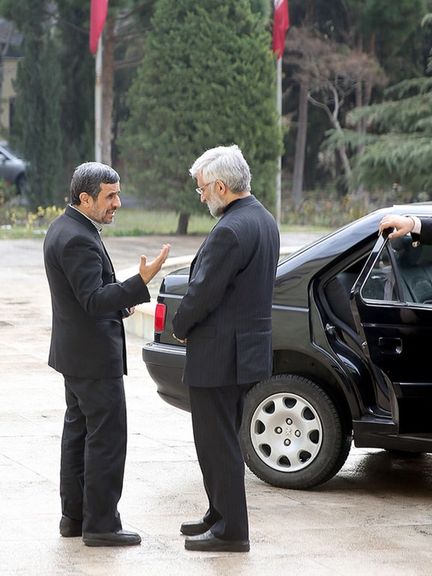
The reason Ahmadinejad, along with others like former hardline nuclear negotiator Saeed Jalili and their fellow ultraconservatives in the Paydari Party, have avoided to speak out is because if they do, they would be compelled to echo Khamenei's praise and support for Hamas's actions. However, the Iranian public opinion largely supports Israel, and they are caught between a rock and a hard place.
During the past week, former Reformist President Mohammad Khatami and former Foreign Minister Javad Zarif in social media posts and press interviews supported Khamenei's positions and immediately came under fire by the public for sympathizing with Hamas.
However, Faraz daily noted that although the state television in Iran, which is the closest media outlet to Khamenei, reflected Khatami and Zarif's opinions about Hamas, it continued its usual criticism of both Reformist figures. Khamenei’s hardliner loyalists do not miss an opportunity to attack anyone who might be slightly independent of the ruler’s rhetoric and confrontational policies.
The media coverage of Ahmadinejad and Jalili's silence may be an attempt by Iran's hardliners to pressure them and their like-minded politicians into expressing support for Khamenei. Since the 2022 protests, political backing for Khamenei has mainly come from staunch hardliners who support him, expecting his favor in return.
Former Parliament Speaker Ali Larijani also attempted to remain non-committal. He posted a typically equivocal tweet that was apparently about the war in Israel but didn't explicitly express support for Khamenei pro-Hamas rhetoric. Later, he deleted the tweet and shared an audio message on X, which was equally vague and did not provide the clear support for Khamenei that hardliners desired.
Centrist daily Sazandegi on Saturday criticized Ahmadinejad and Jalili as well Iranian Nobel laureates Shirin Ebadi (2003) and Narges Mohammadi (2023) for their silence about Gaza. However, the daily did not say why the members of Executives of Sazandegi Party, to which the newspaper belongs, have not been openly taking a stance on the Gaza war and why those mentioned in the article need to rush to express their opinion.
The purpose of the newspaper for attacking these individuals was possibly to show its loyalty to Khamenei in a bid to secure his approval for the candidacy of its affiliated party members in the upcoming March parliamentary elections.
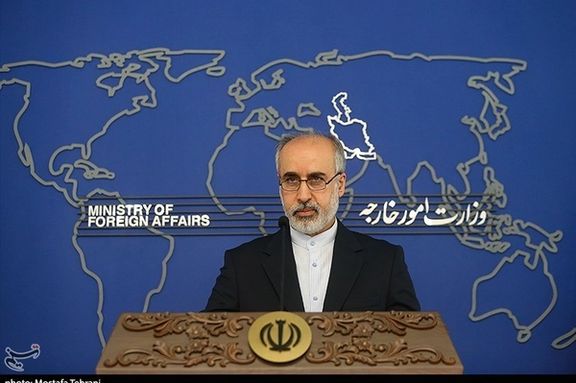
As Israel confirmed that 199 hostages are held in Gaza, Iran's Foreign Ministry claims that its proxy Hamas has expressed readiness to release civilian detainees.
In a Monday press conference, spokesperson for the Ministry of Foreign Affairs Naser Kanaani said, "The Palestinian resistance movement has informed us they are prepared to take necessary actions for the liberation of prisoners and non-military detainees they hold." Kanaani also emphasized the need for “specific prerequisites” to be met for this to become a reality.
There has been no announcement on this through official Hamas channels as yet, while countries including Qatar, Egypt and the US work to release the hostages, dozens of whom are from countries from Europe to north and south America.
While Israel prepares for a ground operation in Gaza, Kanaani used the press conference as a chance to legitimize the escalation of the conflict which began on October 7, when Hamas invaded Israel by land, sea and air, and massacred at least 1,400 people, including roughly 300 soldiers, with numbers rising.
Holding up posters related to the recent bombings in Gaza, Kanaani threatened that the continued path of conflict could "escalate the situation out of control, leading to a range of possibilities," insinuating its biggest proxy, Hezbollah, will get involved from Israel's northern front.
When questioned about whether Iran might directly intervene in the conflict, Kanaani did not provide a clear response. Instead, he referred to the capabilities of Hamas in self-defense and stated, "Hamas is capable in this domain, which is why the Zionist regime has avoided direct confrontation with resistance groups and has drawn the conflicts into non-military areas."
Hamas receives around $100m from Iran each year in addition to military support and training.
Top echelons of the regime continue to push for action against Israel. Ali Akbar Velayati, an advisor to Supreme Leader Ali Khamenei on international affairs, met with a representative of Hamas in Tehran on Monday. He stated, "You should move forward with all your might."
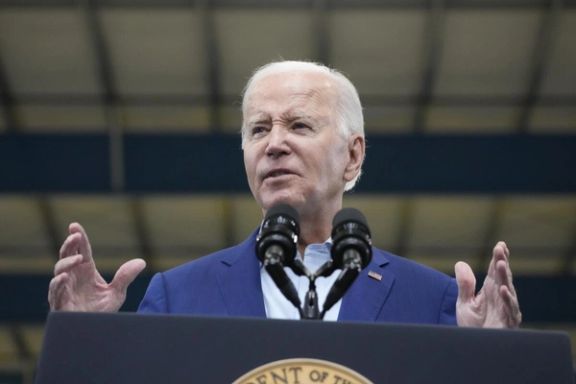
While the US continues to avoid blaming Iran for the Hamas invasion of Israel, President Joe Biden acknowledged the regime’s support for its proxy on Sunday.
And as tensions rise on Israel’s northern border with Lebanon, Iran-backed Hezbollah was more active on Sunday than on any day since the war broke out on October 7, Biden told 60 Minutes: “Hezbollah is a powerful Islamist militia to Israel's north which is armed and trained by Iran. Iran also supports Hamas.”
The unequivocal link to Iran of the recent invasion and atrocities which have left at least 1,400, mostly civilians, butchered after a shock invasion of Hamas special forces, reinforces the fears of the regime’s continued destabilization of the situation.
After multiple attacks from Hezbollah on Sunday, Israel's Ministry of Defense and Israeli Defence Forces announced that residents who live within two kilometers of the border with Lebanon are now being evacuated and offered state-funded accommodation. The move will effect 28 Israeli towns and villages.
Asked for his message to Iran amidst the rising concerns about Tehran possibly getting involved in the war, Biden said simply, “Don't. Don't, don't, don’t,” in a message of deterrence. He reiterated the previous statements from the government that there is “no clear evidence” of Iran’s direct involvement in the Hamas operation, which broke out on October 7, the deadliest single day for Jews since the Holocaust.
Speaking on the hour-long documentary, he said: “Now, Iran constantly supports Hamas and Hezbollah …. [but] did they have foreknowledge, did they help plan the attack, there’s no evidence of that at this point.”
However, the fears of escalation have already seen the US send a powerful naval battle group into the Mediterranean and a pledge to do whatever it takes to support Israel in its battle against Hamas.
Monday morning saw the possible reopening of the Rafah Crossing from Gaza to Egypt to allow the passage of aid and the exit of foreign passport holders, though Israel’s Prime Minister’s office asserted in a press statement there was “no ceasefire”.
On his regional tour, US Secretary of State Antony Blinken and other international diplomats have been working to secure the opening in a bid to retain calm.
Overnight, six top leaders of Hamas’ military and political arms were assassinated, including those directly responsible for the implementation of Operation Al Aqsa Flood, the name given to the invasion on October 7, later declared a war by the terror group, Hamas.
Authorities in Gaza said at least 2,750 people had so far been killed by the Israeli strikes, a quarter of them children, and nearly 10,000 wounded. Another 1,000 people were missing and believed to be under rubble.
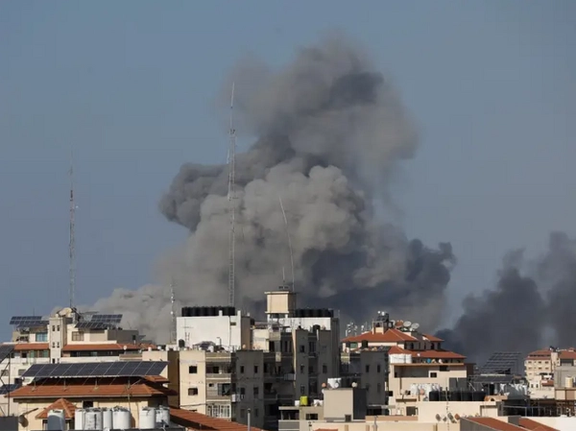
The US has told its citizens in Gaza to get close to the crossing so they can move out, estimating the number of dual-citizen Palestinian-Americans in Gaza at 500 to 600 among the enclave's population of 2.3 million.
Several world leaders are intervening to bring calm, and eyes continue to look to Iran as the backer of its proxies surrounding Israel, including in Syria and the West Bank. French President Emmanuel Macron warned President Ebrahim Raisi against any escalation of the conflict in phone call on Sunday.
”The president of the republic warned President Raisi against any escalation or extension of the conflict, especially to Lebanon," Macron's office said in a statement. "Given its relations with Hezbollah and Hamas, Iran has a responsibility in this respect. Iran must do everything possible to avoid a regional flare-up," it added.
In the US, Senators are also calling for action to weaken the chances of escalation. Senato Lindsey Graham (R-S.C.) warned Iran that should there be escalation on Israel’s northern border, the regime would face consequences.
Speaking in an interview on NBC’s Meet The Press, he vowed to introduce a resolution in the Senate to allow “military action by the United States in conjunction with Israel to knock Iran out of the oil business,” he said.
In a harsh warning, he said: “Iran, if you escalate this war, we’re coming for you.” While official lines from the US government have avoided blaming Iran for the war, he said it was “laughable” to say the regime was not responsible for the October 7 invasion given the historic backing given to the proxy group.